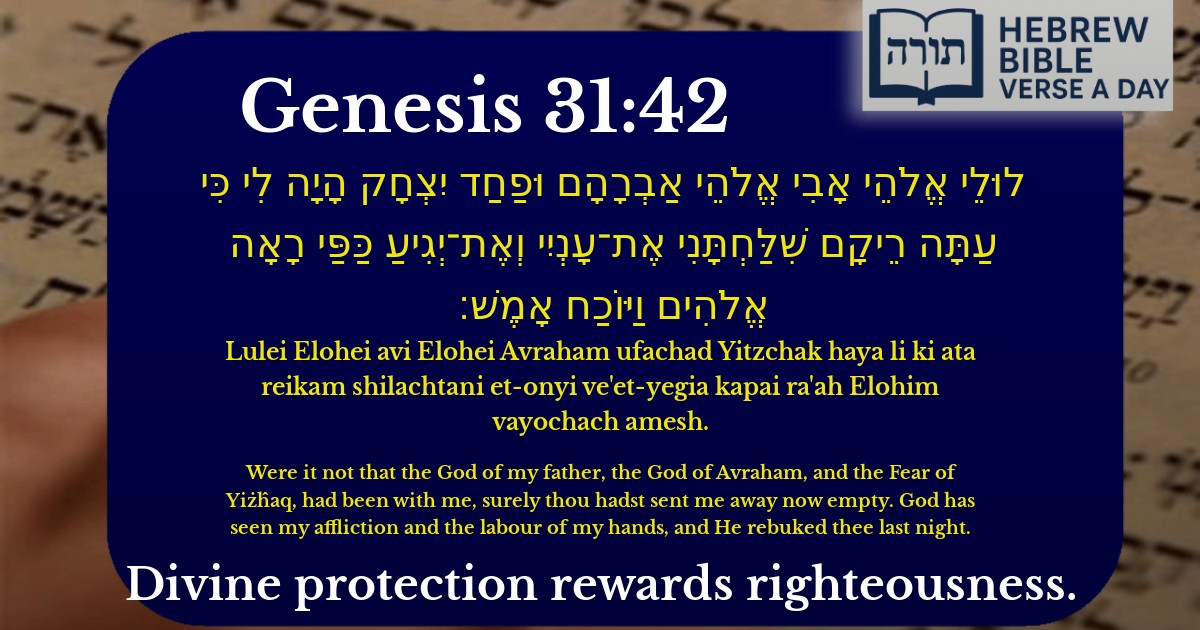Join Our Newsletter To Be Informed When New Videos Are Posted
Join the thousands of fellow Studends who rely on our videos to learn how to read the bible in Hebrew for free!
Hebrew Text
לוּלֵי אֱלֹהֵי אָבִי אֱלֹהֵי אַבְרָהָם וּפַחַד יִצְחָק הָיָה לִי כִּי עַתָּה רֵיקָם שִׁלַּחְתָּנִי אֶת־עָנְיִי וְאֶת־יְגִיעַ כַּפַּי רָאָה אֱלֹהִים וַיּוֹכַח אָמֶשׁ׃
English Translation
Were it not that the God of my father, the God of Avraham, and the Fear of Yiżĥaq, had been with me, surely thou hadst sent me away now empty. God has seen my affliction and the labour of my hands, and He rebuked thee last night.
Transliteration
Lulei Elohei avi Elohei Avraham ufachad Yitzchak haya li ki ata reikam shilachtani et-onyi ve'et-yegia kapai ra'ah Elohim vayochach amesh.
Hebrew Leining Text
לוּלֵ֡י אֱלֹהֵ֣י אָבִי֩ אֱלֹהֵ֨י אַבְרָהָ֜ם וּפַ֤חַד יִצְחָק֙ הָ֣יָה לִ֔י כִּ֥י עַתָּ֖ה רֵיקָ֣ם שִׁלַּחְתָּ֑נִי אֶת־עׇנְיִ֞י וְאֶת־יְגִ֧יעַ כַּפַּ֛י רָאָ֥ה אֱלֹהִ֖ים וַיּ֥וֹכַח אָֽמֶשׁ׃
לוּלֵ֡י אֱלֹהֵ֣י אָבִי֩ אֱלֹהֵ֨י אַבְרָהָ֜ם וּפַ֤חַד יִצְחָק֙ הָ֣יָה לִ֔י כִּ֥י עַתָּ֖ה רֵיקָ֣ם שִׁלַּחְתָּ֑נִי אֶת־עׇנְיִ֞י וְאֶת־יְגִ֧יעַ כַּפַּ֛י רָאָ֥ה אֱלֹהִ֖ים וַיּ֥וֹכַח אָֽמֶשׁ׃
🎵 Listen to leining
Parasha Commentary
📚 Talmud Citations
This verse is quoted in the Talmud.
📖 Chullin 91a
The verse is referenced in a discussion about Jacob's encounter with Laban, illustrating divine protection and justice.


Context of the Verse
This verse (Bereshit 31:42) is part of Yaakov's confrontation with Lavan after working for him for twenty years. Yaakov attributes his success and protection to Hashem, emphasizing that without Divine intervention, Lavan would have sent him away empty-handed despite his years of labor.
Interpretation of Key Phrases
Divine Protection and Justice
Yaakov acknowledges that Hashem saw his suffering ("עָנְיִי") and the toil of his hands ("יְגִיעַ כַּפַּי"). The Sforno explains that this refers to both the physical hardship Yaakov endured and the honest labor he invested. The phrase "וַיּוֹכַח אָמֶשׁ" (He rebuked thee last night) alludes to Hashem's intervention in the dream where He warned Lavan not to harm Yaakov (Bereshit 31:24). The Malbim notes that this demonstrates Hashem's role as the ultimate Judge who protects the oppressed.
Theological Significance
This verse underscores the principle of hashgacha pratit (Divine providence), showing how Hashem oversees the lives of the righteous and intervenes on their behalf. The mention of Avraham and Yitzchak highlights the continuity of the covenant and the merit of the Avot. The Netziv (Ha'amek Davar) adds that Yaakov's wording teaches humility—even a tzaddik like Yaakov relies on the merit of his ancestors.